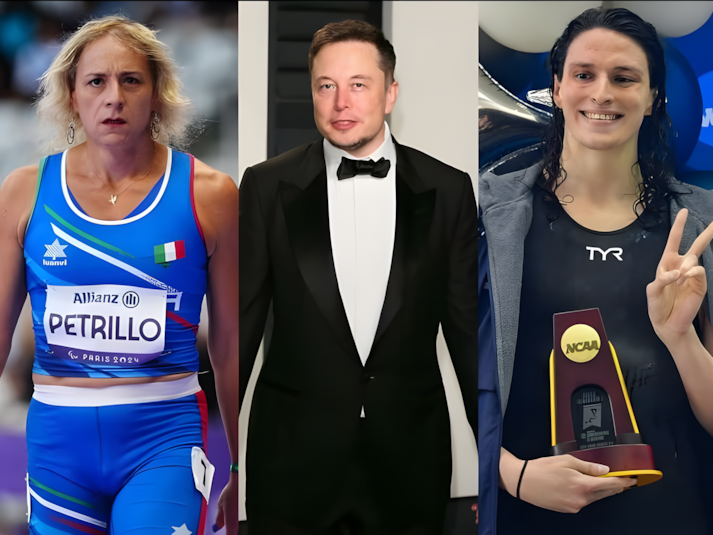Elon Musk, the billionaire entrepreneur and owner of X (formerly Twitter), has once again ignited a heated debate—this time over gender identity in sports. The Tesla and SpaceX CEO has taken a strong stance against the inclusion of male-born athletes in women’s competitions, urging a boycott of events that allow such participation. He has also called for strict penalties for what he deems as “cheating” in professional and amateur sports.

Musk’s Controversial Statement
Musk made his latest remarks on X, where he has frequently expressed opinions on social and political matters. In a post that quickly went viral, he wrote, “It’s simple: if biological men are allowed to compete in women’s sports, it’s cheating. We should boycott these events until fairness is restored.”
This statement instantly sparked a firestorm of reactions from both supporters and critics. Many conservatives and women’s rights advocates praised Musk for taking a stand on an issue they feel is undermining women’s sports. Meanwhile, transgender rights activists and inclusion advocates condemned his comments as harmful and discriminatory.
A Growing Debate on Transgender Athletes
The inclusion of transgender athletes in women’s sports has been a contentious issue for years, with governing bodies struggling to balance inclusivity with fairness. Critics argue that athletes born male retain physical advantages even after hormone therapy, giving them an edge over female competitors. Proponents, however, stress that excluding transgender athletes violates their rights and goes against the spirit of inclusivity.
Several high-profile cases have intensified this debate. The victories of transgender athletes in competitions such as swimming, weightlifting, and track and field have led to accusations of unfairness and calls for new regulations. Some sports organizations, like World Athletics and FINA (the international swimming federation), have already implemented restrictions on transgender athletes competing in female categories.
Musk’s involvement has brought renewed attention to the issue, with his vast social media influence ensuring that the conversation reaches a global audience.

Boycotting and Its Potential Impact
Musk’s call for a boycott raises questions about how effective such a movement could be. Boycotts have historically been used as a tool for social and political change, from civil rights movements to consumer protests against corporations. If a significant number of athletes, fans, or sponsors take Musk’s advice seriously, it could put pressure on sports organizations to reconsider their policies.
Some women’s sports advocates have already supported the idea. Riley Gaines, a former collegiate swimmer and outspoken critic of transgender inclusion in women’s sports, responded to Musk’s post with enthusiasm, stating, “This is exactly what we need. Women’s sports deserve fairness and protection.”
However, opponents argue that a boycott would not address the root of the issue and could instead further marginalize transgender athletes. Many believe that a more constructive approach would involve discussions between athletes, governing bodies, and policymakers to find solutions that uphold both fairness and inclusivity.
The Demand for Strict Penalties
Beyond the boycott, Musk also called for stricter penalties for what he considers “cheating” in sports. He suggested that any athlete who knowingly competes in a category that does not align with their biological sex should face serious consequences, including disqualification and bans.
Sports organizations already have policies to address eligibility, but the enforcement and specifics vary. Some, like the International Olympic Committee (IOC), have issued guidelines that allow transgender women to compete under specific conditions, such as maintaining testosterone levels below a certain threshold. Others, like USA Powerlifting, have outright banned transgender women from female categories.
If Musk’s push for stricter enforcement gains traction, it could lead to tougher regulations across various sports. However, implementing such measures would require collaboration between international sports federations, legal experts, and human rights organizations.
Political and Cultural Reactions
As expected, Musk’s comments have sparked strong political reactions. Conservative politicians and media personalities have largely applauded his stance, seeing it as a defense of women’s rights. Figures such as Florida Governor Ron DeSantis and former U.S. President Donald Trump have previously spoken out against transgender participation in women’s sports, making Musk’s remarks align with their rhetoric.
On the other hand, progressive leaders and LGBTQ+ advocates have criticized Musk for fueling division. Organizations like the Human Rights Campaign and GLAAD have accused him of spreading harmful narratives that contribute to discrimination against transgender individuals.
The cultural impact of Musk’s comments is also significant. His influence extends beyond business and technology, shaping discussions on social issues that resonate with millions worldwide. Whether his call to action leads to tangible change remains to be seen, but it has certainly reinvigorated a polarizing debate.
Potential Consequences for Musk and His Businesses
Musk’s willingness to speak out on controversial topics has sometimes resulted in backlash for his companies. Tesla, SpaceX, and X all rely on diverse customer bases, including individuals who may disagree with his views. While some believe his stance could strengthen his popularity among conservative consumers, others warn that it may alienate progressive audiences and employees.
In the past, Musk has shown little concern for potential business consequences when voicing his opinions. His “free speech absolutist” approach has already led to clashes with advertisers and activists, particularly since acquiring X. If this latest controversy escalates, it could impact partnerships, sponsorships, or even stockholder confidence in his enterprises.

What Comes Next?
The debate over transgender participation in sports is unlikely to fade anytime soon, and Musk’s comments have only added fuel to the fire. Whether his call for a boycott gains widespread traction will depend on public sentiment and the responses of athletes, sports organizations, and policymakers.
One possible outcome is increased pressure on governing bodies to refine their policies. Some organizations may implement stricter eligibility criteria, while others could face legal challenges over their existing regulations. Additionally, the broader cultural conversation about gender, identity, and fairness in sports is likely to continue evolving in the coming years.
Ultimately, Musk’s intervention highlights the complex intersection of sports, science, politics, and identity. While his remarks have drawn both praise and criticism, they have undeniably brought renewed attention to an issue that remains one of the most divisive topics in modern athletics.


